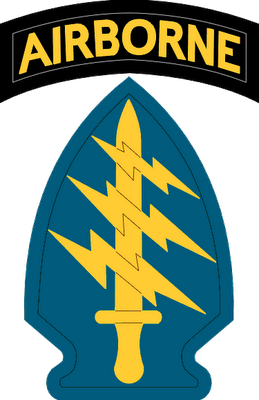This song is a combination of five different MusicMaster Oldies categories: Novelty, Political Protest, Answer Song, Garage Rock, and Future Superstars. The group behind this record was Doug Brown And The Omens, one of the many local rock groups and future superstars that appeared regularly at The Hideout in Southfield, Michigan back in the 1960’s. This song doesn’t promote the military service, but that doesn’t mean it’s not patriotic. It’s actually a rare case of a novelty record that takes aim at those who protested the Vietnam war back in the 1960’s.
Here’s The Ballad Of The Yellow Beret by Beach Bums on Are You Kidding Me 1010 from 1966:
The song is a parody of The Ballad Of The Green Berets by Barry Sadler, a huge hit in February 1966, hitting #1 on the Billboard Hot 100, Cashbox, and Billboard Adult Contemporary charts, as well as #2 on the Country charts. It even climbed to #4 in Canada (CHUM Toronto) and Germany, #5 in Australia, and #24 in England. It sold over two million copies in just the first two weeks. It was issued on RCA 8739 very early in 1966.
Barry Sadler was actually a Staff Sergeant in the U.S. Army Special Forces (known as the Green Berets). He served in Vietnam until he injured his leg in a booby trap.
The Ballad Of The Yellow Beret wasn’t the only Answer Song based on Barry Sadler’s hit. There were several others in 1966 including He Wore The Green Beret by Nancy Ames on Epic and also by Lesley Miller on RCA. There was also The Son Of A Green Beret (A Child’s Ballad Of The Green Berets) by Craig Arthur on Holton. There was even a budget cover of the song credited to Herb Eaton on Hit 242.
The Beach Bums fall into the Future Superstar category because it’s also an early appearance of Bob Seger. In fact, it’s the second commercial record to feature Bob Seger on vocals.
Here’s the first time Bob Seger appeared on a commercial release. This is TGIF (Thank Goodness It’s Friday) by Doug Brown (with Bob Seger) on Punch 1008 from 1965:
Most of the songs coming out of the Hideout groups were issued on Hideout/Punch label, although Ballad Of The Yellow Beret used Are You Kidding Me as the label name, and gave composer credits to D. Dodger (Draft Dodger), even though the song was written by Bob Seger. Of course, the lawyers had to get involved. When RCA and Barry Sadler heard this parody, they threatened a lawsuit, forcing them to withdraw the single from the market. For that reason alone, they’re pretty hard to find these days.
Right after making the Ballad Of The Yellow Beret, Doug Brown helped Bob Seger produce the first record to carry Bob Seger’s name, a gritty garage rock “death” song about urban crime called East Side Story by Bob Seger And The Last Heard. That was a song Bob had written for The Underdogs, who failed to do much with it. Bob’s version is awesome, however! It was first issued on Hideout 1013.
Bob Seger called his first group the Last Heard, basically meaning the latest group featuring members of other local groups, The Omens and The Town Criers. Former Town Criers members who formed The Last Heard included Carl Lagassa on guitar, Dan Honaker on bass, and Pep Perrine on drums. East Side Story was very popular in the Detroit area, enough to catch the attention of Cameo-Parkway Records, who issued the song for national distribution on Cameo 438. They followed this up with a few more singles from Bob Seger And The Last Heard, the last one being Heavy Music, a song that might have become a big hit had it not been for the fact that the company suddenly went out of business shortly after its release.
Of course, Bob’s career survived. He got picked up by Capitol Records and changed his band to Bob Seger System. He made a record called 2 + 2 on Capitol in 1968 which didn’t make it on Billboard’s charts, but it did manage to show up at #90 on Cashbox.
He finally hit the big time with Ramblin’ Gamblin’ Man in 1969, which hit #17 on Billboard, #22 on Cashbox, and #12 in Canada on CHUM in Toronto. What you may not know is that Bob’s friend Glenn Frey played acoustic guitar and sang backing vocals on Ramblin’ Gamblin’ Man!
I’m also very fond of the last single credited to Bob Seger System, a song called Lucifer 1970 which also appeared on his Mongrel album. In 1971, he dropped the word System and recorded as simply Bob Seger. In 1976, he changed the name once more to Bob Seger And The Silver Bullet Band and went on to turn several pages of rock history.
You’ll hear all of these songs and many more like them on MusicMaster Oldies. If a song touched any part of the charts from 1955 to 1970, I’m playing it, along with even more B-sides and singles that never got anywhere near the charts, even though many of them should have!

